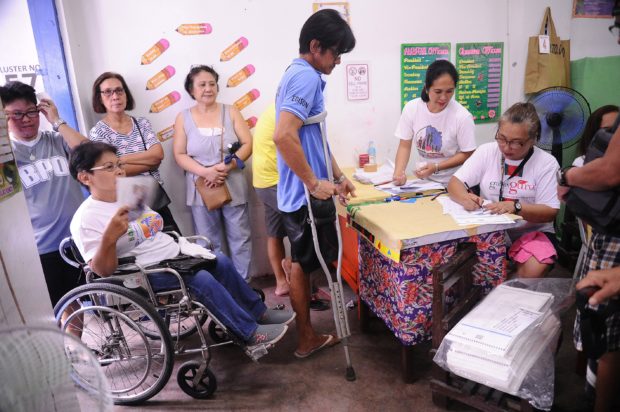
(FILE PHOTO) EAGER AND ABLE People with disabilities were among the early voters who turned up on Monday, May 13, 2021, at Marick Elementary School in Cainta, Rizal province. They cast their ballots with the help of schoolteacher Cez Dolar acting as an election official. —AUGUST DELA CRUZ
MANILA, Philippines — Senator Imee Marcos on Tuesday pressed for an accurate and complete national database for persons with disabilities (PWDs), citing the failure of government to so much as provide a proper identification (ID) cards for members of the sector.
During the meeting of the Senate panel on Social Justice, Welfare and Rural Development, Marcos pointed out that the lack of a consolidated list of Filipinos with disabilities “always seems to be our weakness in providing PWD identification cards.”
“Ang listahan ng may kapansanan sa atin ay watak-watak… Iyong mga recipient ng Pantawid Pamilyang Pilipino Program (4Ps), nakalista sa Department of Social Welfare and Development (DSWD). Iyong nagre-receive ng health services, kay Department of Health (DOH). Iyong humihingi ng PWD IDs, peke man o hindi peke, ay nasa iba’t ibang local government units.],” she said.
(The database of PWDs in the country is scattered…. The PWD recipients of the 4Ps are listed with the DSWD. The list of PWDs who avail of health services are with the DOH, and those who apply for PWD IDs, whether fake or not, are with the different LGUs.)
The country’s latest census recorded 1.44 million PWDs, but the DOH’s Philippine Registry for PWDs (PRPWD) has only accounted for at least 670,000.
READ: Solons ask for updated list of PWDs amid coronavirus pandemic
National Council on Disability Affairs (NCDA) deputy executive director Matteo Lee Jr. also acknowledged an existing discrepancy in the number of PWDs across the different government agencies.
“Kung ma-mandate din sa amin sa NCDA, isusulong po namin na ang database system ay talagang mapag-usapan na sa NCDA para po ang profile ay mama-manage at administer by NCDA. Sa ngayon po, nakakalat iyong database. Iba-ibang government agencies, based on the program, meron silang data on PWDs,” he said.
(If given the mandate, we will push for the database system to be discussed in the NDCA, so we can manage and administer the PWD profiles. The current database is scattered across the different government agencies based on their respective programs which involve PWD recipients.)
While he admitted that there is slow progress in identifying the exact number of PWDs in the community, Lee assured that the NCDA is aiming to fast-track its systems to include all PWDs in the national database.
He then noted the NCDA is currently verifying and mirroring the DOH database, but they are also pushing to include the creation of a consolidated PWD database through the national ID system.
Tracking delays, tracing discrepancies
NCDA division chief Atty. Rhealeth Ramos argued that there are delays when LGUs forward the total number of their PWD constituents to the DOH.
“The discrepancy is due to the fact that the uploading of data to the PRPWD – the national database – is not real time as of the moment. They should be uploading but right now, the data is not current when it comes to uploading,” she said during the Senate meeting.
The discrepancy in the recorded PWDs, on the other hand, may be due to the “different set of parameters used,” according to former NCDA executive director Emerito Rojas.
He explained to INQUIRER.net over the phone that the current total of PWDs in the country, as recorded by the DOH, is accurate and tangible but still incomplete.
“You cannot manage something that you do not measure,” Rojas said. “Tama iyong data ng DOH. Kinulang lang na ma-populate iyong database.”
(The DOH data is correct but there were shortcomings in populating the database.)
Rojas said there may be more than 1.5 million PWDs in the country, and that this figure “may even double” with the inclusion of cancer and other rare diseases as disabilities under the National Integrated Cancer Control Act and the Rare Diseases Act of the Philippines.

